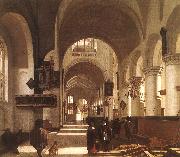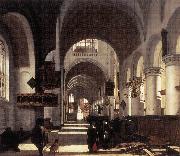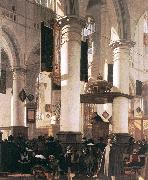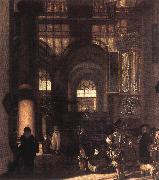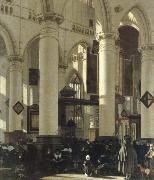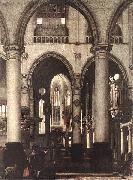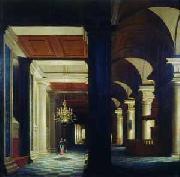Wholesale Oil Painting Reproductions No Minimum and Door to Door! |
|||||||||||
|
|
|||||||||||

|
|||||||||||
|
|
|
||||||||
All Emmanuel de Witte Oil Paintings |
||||||||
|
|
||||||||
|
|
||||||||
|
Artist Introduction: Dutch
1617-1692
Emmanuel de Witte Gallery
Dutch painter. He was one of the last and, with Pieter Saenredam, one of the most accomplished 17th-century artists who specialized in representing church interiors. He trained with Evert van Aelst (1602-57) in Delft and in 1636 joined the Guild of St Luke at Alkmaar, but he was recorded in Rotterdam in the summers of 1639 and 1640. In October 1641 his daughter was baptized in Delft, where he entered the Guild of St Luke in June 1642 and lived for a decade, moving to Amsterdam c. 1652. He began his long career as an unpromising figure painter, as can be seen in the Vertumnus and Pomona (1644) and two small pendant portraits (1648; all Rotterdam, Mus. Boymans-van Beuningen). |
||||||||
|
|
||||||||
|
Interior of a Church Painting ID:: 576 |
Boymans van Beuningen Museum, Rotterdam |
|||||||
Height Width |
INS/CM Quality |
|||||||
|
X |
| |||||||
|
|
||||||||
All WITTE, Emanuel de Oil Paintings |
||||||||
|
|
||||||||
|
|
||||||||
|
Artist Introduction: Dutch Baroque Era Painter, ca.1617-1691
Dutch painter. He was one of the last and, with Pieter Saenredam, one of the most accomplished 17th-century artists who specialized in representing church interiors. He trained with Evert van Aelst (1602-57) in Delft and in 1636 joined the Guild of St Luke at Alkmaar, but he was recorded in Rotterdam in the summers of 1639 and 1640. In October 1641 his daughter was baptized in Delft, where he entered the Guild of St Luke in June 1642 and lived for a decade, moving to Amsterdam c. 1652. He began his long career as an unpromising figure painter, as can be seen in the Vertumnus and Pomona (1644) and two small pendant portraits (1648; all Rotterdam, Mus. Boymans-van Beuningen). Jupiter and Mercury in the House of Philemon and Baucis (1647) and a Rembrandtesque Holy Family |
||||||||
|
|
||||||||
|
|
Interior of a Church Painting ID:: 7271 |
1668
Oil on canvas
Museum Boymans-van Beuningen, Rotterdam |
||||||
Height Width |
INS/CM Quality |
|||||||
|
X |
| |||||||
|
|
||||||||
All WITTE, Emanuel de Oil Paintings |
||||||||
|
|
||||||||
|
|
||||||||
|
Artist Introduction: Dutch Baroque Era Painter, ca.1617-1691
Dutch painter. He was one of the last and, with Pieter Saenredam, one of the most accomplished 17th-century artists who specialized in representing church interiors. He trained with Evert van Aelst (1602-57) in Delft and in 1636 joined the Guild of St Luke at Alkmaar, but he was recorded in Rotterdam in the summers of 1639 and 1640. In October 1641 his daughter was baptized in Delft, where he entered the Guild of St Luke in June 1642 and lived for a decade, moving to Amsterdam c. 1652. He began his long career as an unpromising figure painter, as can be seen in the Vertumnus and Pomona (1644) and two small pendant portraits (1648; all Rotterdam, Mus. Boymans-van Beuningen). Jupiter and Mercury in the House of Philemon and Baucis (1647) and a Rembrandtesque Holy Family |
||||||||
|
|
||||||||
|
|
Interior of a Church Painting ID:: 7272 |
c. 1660
Oil on canvas, 80 x 66 cm
The Hermitage, St. Petersburg |
||||||
Height Width |
INS/CM Quality |
|||||||
|
X |
| |||||||
|
|
||||||||
All WITTE, Emanuel de Oil Paintings |
||||||||
|
|
||||||||
|
|
||||||||
|
Artist Introduction: Dutch Baroque Era Painter, ca.1617-1691
Dutch painter. He was one of the last and, with Pieter Saenredam, one of the most accomplished 17th-century artists who specialized in representing church interiors. He trained with Evert van Aelst (1602-57) in Delft and in 1636 joined the Guild of St Luke at Alkmaar, but he was recorded in Rotterdam in the summers of 1639 and 1640. In October 1641 his daughter was baptized in Delft, where he entered the Guild of St Luke in June 1642 and lived for a decade, moving to Amsterdam c. 1652. He began his long career as an unpromising figure painter, as can be seen in the Vertumnus and Pomona (1644) and two small pendant portraits (1648; all Rotterdam, Mus. Boymans-van Beuningen). Jupiter and Mercury in the House of Philemon and Baucis (1647) and a Rembrandtesque Holy Family |
||||||||
|
|
||||||||
|
|
Interior of a Church Painting ID:: 7273 |
1674
Oil on canvas, 79x 69 cm
Wallraf-Richartz Museum, Cologne |
||||||
Height Width |
INS/CM Quality |
|||||||
|
X |
| |||||||
|
|
||||||||
All WITTE, Emanuel de Oil Paintings |
||||||||
|
|
||||||||
|
|
||||||||
|
Artist Introduction: Dutch Baroque Era Painter, ca.1617-1691
Dutch painter. He was one of the last and, with Pieter Saenredam, one of the most accomplished 17th-century artists who specialized in representing church interiors. He trained with Evert van Aelst (1602-57) in Delft and in 1636 joined the Guild of St Luke at Alkmaar, but he was recorded in Rotterdam in the summers of 1639 and 1640. In October 1641 his daughter was baptized in Delft, where he entered the Guild of St Luke in June 1642 and lived for a decade, moving to Amsterdam c. 1652. He began his long career as an unpromising figure painter, as can be seen in the Vertumnus and Pomona (1644) and two small pendant portraits (1648; all Rotterdam, Mus. Boymans-van Beuningen). Jupiter and Mercury in the House of Philemon and Baucis (1647) and a Rembrandtesque Holy Family |
||||||||
|
|
||||||||
|
|
interior of a church Painting ID:: 56100 |
mk247
c.1680,oil on canvas,47.25x41 in,120x104 cm,hamburger kunsthalle,hamburg,germany |
||||||
Height Width |
INS/CM Quality |
|||||||
|
X |
| |||||||
|
|
||||||||
All Emanuel de Witte Oil Paintings |
||||||||
|
|
||||||||
|
|
||||||||
|
Artist Introduction: (1617 - 1692) was a Dutch perspective painter. In contrast to Pieter Jansz Saenredam, who emphasized architectural accuracy, De Witte was more concerned with the atmosphere of his interiors. Though few in number, de Witte also produced genre paintings.
De Witte was born in Alkmaar and learned geometry from his father, a schoolmaster. He joined the local Guild of St Luke in 1636. After a stay in Rotterdam, he moved to Delft and studied with Evert van Aelst. In 1651 de Witte settled in Amsterdam where his first wife, Geerje Arents, died in 1655. He then married a 23-year-old orphan, Lysbeth van der Plas, who exercised a bad influence on de Witte's adolescent daughter. In December 1659 both were arrested for theft from a neighbor.Lysbeth, pregnant, had to leave the city for a period of six years; she lived outside the city walls and died in 1663.
Following the arrest of his wife and child, de Witte was forced to indenture himself to the Amsterdam notary and art dealer Joris de Wijs, surrendering all of his work in exchange for room, board, and 800 guilders annually. De Witte broke the contract, was sued by the dealer, and forced to indenture himself further as a result. Several patrons provided de Witte with support, but these relations did not work out well, for he tended to shout at his clients and at people watching him at work in churches. Records tell of his gambling habit and a fight with Gerard de Lairesse. According to Arnold Houbraken, after an argument about the rent, de Witte hanged himself from a canal bridge in 1692. The rope broke and de Witte drowned. Because the canal froze that night, his corpse was not found until eleven weeks later
|
||||||||
|
|
||||||||
|
|
Interior of a Church Painting ID:: 89776 |
second half of 17th century
Medium oil on wood
cyf |
||||||
Height Width |
INS/CM Quality |
|||||||
|
X |
| |||||||
|
|
||||||||
All Daniel Ridgway Knight Oil Paintings |
||||||||
|
|
||||||||
|
|
||||||||
|
Artist Introduction: (March 15, 1839 - March 9, 1924) was an American artist born at Philadelphia, Pennsylvania. He was a pupil at the Ecole des Beaux-Arts, Paris, under Gleyre, and later worked in the private studio of Meissonier. After 1872 he lived in France, having a house and studio at Poissy on the Seine.
Spring BlossomsHe painted peasant women out of doors with great popular success. He was awarded the silver medal and Cross of the Legion of Honor, Exposition Universelle, Paris, 1889, and was made a Knight of the Royal Order of St. Michael of Bavaria, Munich, 1893, and receiving the gold medal of honor from the Pennsylvania Academy of the Fine Arts, Philadelphia, 1893. His son, Louis Aston Knight (1873 - 1948), is also known as a landscape painter.
|
||||||||
|
|
||||||||
|
|
Interior of a church Painting ID:: 97809 |
1652(1652)
Medium oil on panel
Dimensions 73 x 75 cm
cyf |
||||||
Height Width |
INS/CM Quality |
|||||||
|
X |
| |||||||
|
|
||||||||
|
Prev Next
|
||||||||
|
|
||||||||
|
Related Paintings to Daniel Ridgway Knight :. |
||||||||
|
|
||||||||
|
CONTACT US |
